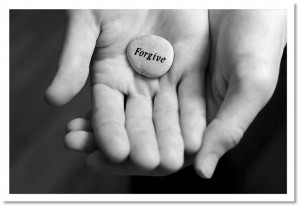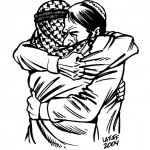When his mother died, Mark began to go through her belonging. Knowing she was meticulously organized, he was not surprised to find a stack of daily planners. They covered the years 1948-1997.
He began to look through them and saw a clear pattern. Every day had a list. Most items on the list had lines through them, indicating they had been completed. Incomplete ones had a circle around them.

Beginning in 1955, every October 22nd the entry “Call Sylvia” was etched at the top of the page. October 22nd was Sylvia’s birthday, and Mark’s mom intended to call her. But every year it remained circled in red, incomplete.
His mother, and her sister-in-law Sylvia, had had some sort of falling out. No one remembered when or why.
In 1987 the item finally had a line running through it. Underneath the entry read, “Visited the cemetery. Told Sylvia I was sorry.”
How Did It Get This Way?
For 32 years two relatives could not speak to one another, even though at least one of them wanted to. It was too hard, too painful. Just imagine what life would been had they made amends. One less hole in heart at the time of death. One less piece of unfinished business. (I first heard this story from Rabbi David Whiman)
How many of us walk around with a hole in our hearts? How many of us want to forgive but can’t or won’t? For some even the thought of forgiveness can generate enormous pain and resistance.
There is no three- or ten-step process for forgiving. If there was, we would all know it. There are only questions we can ask ourselves. Here are a few to consider:
Questions To Ask Ourselves
1. What did I do? There is a difference between being right and being effective. We may (rightly) believe we did nothing wrong in creating the rift in a relationship. We may think our brother or our sister has rewritten history, imagining we said things we never said.
But something happened. Understanding that, and trying to appreciate the situation from the other’s point of view, will help immensely in giving us strength and perspective to forgive.
2. Am I hurting myself? We tend to magnify the way others see us. We assume that what consumes our attention also consumes theirs. This truth often creates misunderstanding in a marriage. It can also impede healing and reconciliation. We think we are “teaching him a lesson” when we withhold forgiveness. We think we are achieving some kind of vengeance. We think that to forgive is to condone.
Forgiving is not condoning. It is moving on. It is removing a roadblock on our path. Forgiveness is a gift we give ourselves.
3. Am I asking too much of someone else? We often wait for the other person to make a move. Perhaps they are not capable of doing so. Perhaps they hurt as we do.
In the classic work of Jewish wisdom, Ethics of the Fathers, the sages taught, “In a place where there are on human beings, be a human being.” In other words, do the right thing regardless of what another person does.
4. How would I feel if the relationship was repaired? We may have learned to live with the broken relationship. Life demands it.
Yet, just as a scab conceals a hidden wound, silence can hide a hurting heart. Envisioning a healing, a reconciliation, can strengthen our motivation. Imagine the way forgiveness would feel.
5. If not now, when?
By Evan Moffic, Rabbi of Congregation Solel in Highland Park.
To Inspire Yourself and Discover More, check out Rabbi Moffic’s free weekly digest of spiritual wisdom


